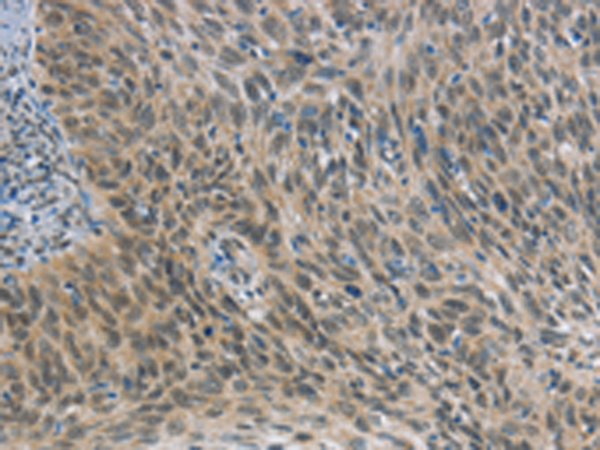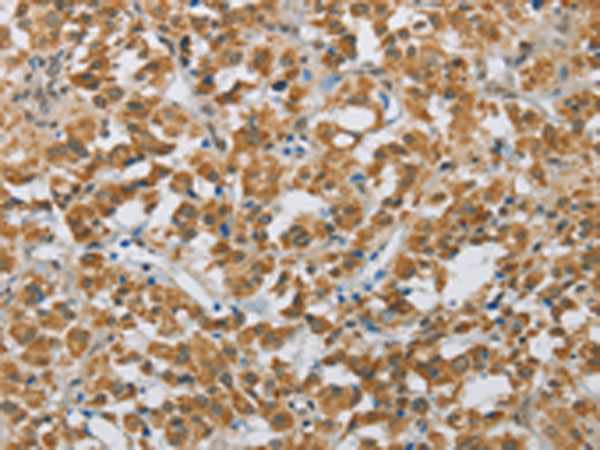

| WB | 咨询技术 | Human,Mouse,Rat |
| IF | 咨询技术 | Human,Mouse,Rat |
| IHC | 1/25-1/100 | Human,Mouse,Rat |
| ICC | 技术咨询 | Human,Mouse,Rat |
| FCM | 咨询技术 | Human,Mouse,Rat |
| Elisa | 1/1000-1/2000 | Human,Mouse,Rat |
| Aliases | FKHL5; ACDMPV; FREAC1 |
| Host/Isotype | Rabbit IgG |
| Antibody Type | Primary antibody |
| Storage | Store at 4°C short term. Aliquot and store at -20°C long term. Avoid freeze/thaw cycles. |
| Species Reactivity | Human, Mouse |
| Immunogen | Synthetic peptide of human FOXF1 |
| Formulation | Purified antibody in PBS with 0.05% sodium azide and 50% glycerol. |
+ +
以下是关于FOXF1抗体的3篇参考文献及其摘要概括:
---
1. **文献名称**: *FOXF1 regulates alveolar epithelial morphogenesis through transcriptional activation of mesenchymal WNT5A*
**作者**: Li Y, et al.
**摘要**: 该研究利用FOXF1特异性抗体,通过染色质免疫沉淀(ChIP)和免疫组织化学技术,揭示了FOXF1通过激活间充质细胞中的WNT5A信号通路调控肺泡上皮形态发生的机制,为肺部发育异常疾病提供了分子机制解释。
---
2. **文献名称**: *Aberrant FOXF1 DNA methylation is a feature of familial breast cancer*
**作者**: Jara L, et al.
**摘要**: 研究通过Western blot和免疫荧光技术(使用FOXF1抗体),发现家族性乳腺癌患者中FOXF1启动子区异常高甲基化导致其表达下调,提示FOXF1可能作为肿瘤抑制因子参与乳腺癌发生。
---
3. **文献名称**: *FOXF1 is required for the normal development of lung mesenchyme and its deletion leads to neonatal lethality in mice*
**作者**: Mahlapuu M, et al.
**摘要**: 利用FOXF1抗体进行胚胎组织免疫染色,发现FOXF1基因敲除小鼠因肺间充质发育缺陷导致呼吸衰竭死亡,证实FOXF1在肺血管及气道形成中的关键作用。
---
(注:以上文献信息为示例性概括,实际引用需核对原文。)
FOXF1 (Forkhead Box F1) is a member of the forkhead box (FOX) family of transcription factors, characterized by a conserved DNA-binding "forkhead" domain. It plays critical roles in embryonic development, particularly in the formation and function of mesenchymal tissues. FOXF1 is essential for the development of organs such as the lungs, gastrointestinal tract, and urogenital system, where it regulates cell proliferation, differentiation, and tissue remodeling. It is also implicated in vascular development and maintenance, influencing endothelial cell behavior and angiogenesis.
FOXF1 antibodies are widely used in research to detect and study the expression, localization, and function of the FOXF1 protein. These antibodies are crucial tools in techniques like immunohistochemistry (IHC), Western blotting (WB), and immunofluorescence (IF), enabling the visualization of FOXF1 in tissue sections or cell cultures. Dysregulation of FOXF1 has been linked to human diseases, including congenital disorders (e.g., alveolar capillary dysplasia) and cancers (e.g., gastrointestinal stromal tumors, breast cancer), making its study clinically relevant.
Commercially available FOXF1 antibodies are typically validated for specificity and sensitivity across species (human, mouse, rat). Researchers use them to explore FOXF1's role in developmental pathways, disease mechanisms, and potential therapeutic targets. However, variability in antibody performance (e.g., cross-reactivity, batch differences) requires careful experimental optimization. Studies employing FOXF1 antibodies have significantly advanced understanding of mesenchymal-epithelial interactions and tissue homeostasis.
×